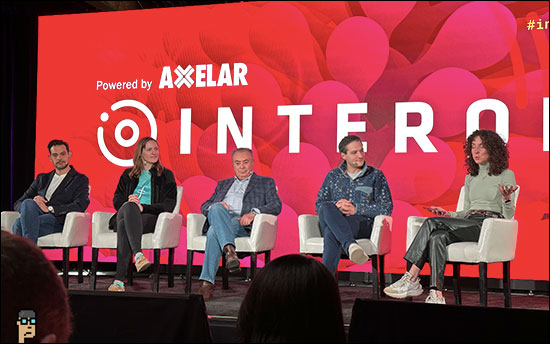As part of the buildup to last weekend’s ETHDenver Ethereum ecosystem conference, a “satellite “conference titled INTEROP took place on February 27-28. Produced by Axelar, a cross-chain infrastructure provider, the conference’s main focus was the Web3 developer community.
And developers are arguably what drew some of the biggest technology companies in the world who showed up to tout their Web3 wares – particularly as it relates to the cloud – including Google, Oracle and Microsoft.
The “elephant” that was not in the room: Amazon.
Below is a selection on each company’s positioning in Web3 according to their participants at INTEROP. (edited for clarity and brevity)
Rich Widmann, Global Head of Strategy, Web3, Google Cloud
“Our goal at Google Cloud is to be the default space for developers to build in Web3. I think a lot of the pain points that that we’ve observed over the last three to four years really happen at that developer level. It’s starting companies; it’s getting familiar with on-chain data; it’s standing up the infrastructure (RPC nodes, validators, etc.); and then there’s a whole host of other issues that relate to storage.”
“If you think about how to get and scale horizontally your node infrastructure – we actually just saw this this weekend with one of the [recent Solana] outages . One of the difficulties was pulling snapshots of the full ledger in order to update validators to get them back up and running and in consensus.”
“Our team’s focus is about solving all of those problems, both big and small. Part of the way that we’re going to do that is offer a managed offering which we call the blockchain node engine. It’s essentially going to abstract away the infrastructure layer, allow people to deploy an RPC node on our infrastructure, and it’s self-healing. So essentially, a DevOps team wouldn’t need to manage it, we take care of it.”
“The other side of that is really the benefit of storage which is we don’t just keep these things in perpetuity for no reason. We keep them so that we can review them, analyze them, draw analytics and apply AI and ML learnings to them. And so our team is also working on a data storage platform that will pipe in on-chain data from multiple protocols and make that available to developers with the click of a button.”
“So that’s what we’ve been working on. Some of this we’re building first-party, a lot of it involves partnership – finding the right partners in the space that augment our offerings so that we can go to market jointly.”
Mark Rakhmilevich, Senior Director, Blockchain Product Management, Oracle
“Just a brief introduction to Oracle Cloud… we started in the space about six years ago [when we] introduced our first cloud platform and our goal has been to make adoption of blockchain technology, broadly speaking, easier and quicker for enterprise customers -businesses that need to run the applications together with other members of the ecosystem, whether its supply chain, financial services, the government and education, retail, a lot of different industries.
“The goal has been to try to make it easier to integrate identity management, provide solutions that will withstand the rigors of business critical applications… Decentralization across multiple cloud regions around the world with the development tools to create applications by customers themselves…”
“Over the last couple of years, we started seeing the shift into the mobile Web3 direction where customers started being interested in leveraging tokenization and it has fallen into two areas: we see customers in media entertainment, retail, telcos, sports leagues, etc., doing basically fan engagement or consumer engagement models using NFTs… [And then,] some customers are actually using NFTs in business applications. For example, representing electronic bill of lading and the supply chain, they need to be tagged from manufacturing through retail to aftermarket resale…”
“For consumer applications, they want to go beyond permissioned blockchains and create hybrid environments…”
Vassilis Tziokas, Web3 Strategy & Business Development Lead, Microsoft
“At Microsoft,… we see every innovation as evolving. Decentralization is here to stay. That’s definitely true. So the way we see it is we want to be where our customers find value. If our customers find value in decentralized storage, which many of our customers do, our job is to provide value either through partnerships or through first party products.”
“Web 2 companies are here adding to the Web3 space. We are here because the value is here, the business is here. We don’t see it as Web 2 versus Web3. We see it as a coexistence, a hybrid model where we learn from the Web3 natives and Web 3 natives can scale the capabilities of most of their web components. That’s our thesis.”

